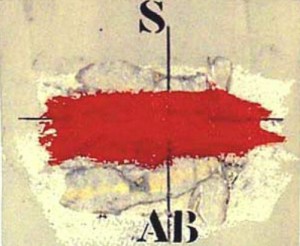Religion and Hybridity: Can someone be Jewish and Christian?
This piece, from the Zeek archive, originally ran in May 2011.
Hybrid Identities in the American Synagogue
There are a number of non-Jews in the Saturday morning Torah study which I lead at Chicago Sinai Congregation. This is not a big surprise. Reform congregations increasingly serve non-Jews, whether they are the partners of Jews or simply fellow travelers. We are a synagogue. We teach, practice, believe, and value Judaism. Anyone is welcome to do this with us.
What was a surprise was Moe. When she joined the class, she introduced herself as a Christian with a strong interest in Judaism. A few months later, she told me that she had decided that she was both Christian and Jewish. I pointed out to her that there is a basic contradiction in her statement: a Christian awaits the second coming of a definite messianic figure, while a Jew awaits the first coming of an unspecified messianic figure – or the coming of a messianic age.
Moe told me that didn’t bother her. She was happy to embrace the contradiction.
Moe is not alone. There are a number of people who participate in our congregation who consider themselves both Jewish and Christian. I don’t mean Messianic Jews or Jews for Jesus. Messianic Jews are supported by institutions which encourage Jews to convert to a variety of evangelical Christianity while maintaining an outward Jewish appearance, or encourage Christians to find a more authentic Christian experience by discovering Christianity’s Jewish roots. Nor am I talking about converts, people considering conversion, or children of interfaith marriages who are deciding as to which faith community they wish to affiliate.
I mean individuals seeking their own personal spirituality at the intersection of faith traditions . There’s an increase in what scholars call “hybrid identities” among searching individuals. But why is this increase is happening now, and what does it means for Jews, Jewish authorities, and Jewish institutions?
Hybrid identity means the process of creating one’s self from different, even contradictory, elements. Someone might consider herself Jewish, integrating the liberal Jewish conception of the messianic age into her beliefs about redemption. At the same time, she might consider herself Christian and accept Jesus as her personal messiah. These two things contradict each other, but can – and do – coexist.
More common than this Jewish-Christian identity are Jewish-Buddhist hybrid identities, which I encountered frequently while working at the JCC in San Francisco. Jewish Buddhists were an integral part of the Jewish community in that city. The JCC even offered Jewish/Buddhist meditation.
But now, Jewish/Christian hybrids are on the rise as well. I mostly see this among young couples that want me to officiate at their weddings. They grew up in mixed Jewish/Christian homes and often marry someone else with a similar background . In my work as a rabbi, I’m seeing an increase in hybrid identities.
Our congregation has made a decision to engage with people creating hybrid identities out of Judaism and other sources. We practice only Judaism in our synagogue, but our Judaism is Open Judaism; we welcome anyone who wants to experience the Jewish tradition. Over the doors of our building, are etched the words of the prophet Isaiah: “My house shall be called a house of prayer for all people” (Isaiah 56:7). We take this seriously.
The majority of the married people in our congregation are married to non-Jews. We have unmarried non-Jews who are members. Some who participate in synagogue life are developing hybrid identities. We see ourselves as heirs to the radical reformer who founded our synagogue, Rabbi Bernhard Felsenthal, and his successor, Rabbi Emil G. Hirsch. We feel a responsibility to face the present with creativity. We choose to face an ever-changing situation that many Jews, Jewish authorities, and Jewish institutions ignore or deny. We face it with openness to individuals creating hybrid religious selves.
Why are hybrid identities on the rise?
Once, basic elements of identity were seen as unchangeable. If your mother is or was a Jew, then you are a Jew. If your father is or was liberal, then you too are liberal. Any shift from these home identities was considered radical and thought of as a conversion. But this is no longer true. An increasing number of people simply don’t accept their parents’ markers of identity. They see identity as something they create themselves. Our identities are no longer essential; they are constructed.
Moreover, identity was seen as a binary issue. One was white or black, Jewish or Gentile, man or woman. This is no longer true. Today our understanding of gender, for instance, goes beyond the binary of “male” and “female.” One may have the physiognomy of a male but identify as a female. Or one may proudly embrace the ambiguity of being both a man and a woman. Religion, like gender, can be understood as a continuum. And that’s how someone like Moe can think of herself as both Jewish and Christian.
Hybrid identities offer their holders a way to resist the norms established by Jews, Jewish authorities, and Jewish institutions. Many Jews and Jewish institutions deny the reality that there are non-Jews in our families, synagogues, and homes. While many synagogues employ a rhetoric of welcoming non-Jews, very few welcome non-Jews to participate in the synagogue the same way as Jews. Whether for halakhic reasons or other reasons, we maintain boundaries which differentiate between non-Jewish and Jewish participation.
But some resist these efforts to maintain clear boundaries. In creating hybrid identities, they partake both of Judaism and of other religions and cultures. When we raise Jewish children to believe that all are created equal, but don’t let non-Jews (including, in many cases, their parents) participate fully in synagogue, we open ourselves to accusations of hypocrisy. Given the reality of mixed-faith families, we shouldn’t be surprised when those same Jewish children begin practicing Buddhist meditation while still considering themselves Jewish, or blending Judaism with other traditions in other ways.
The American religious landscape is rapidly changing. Americans are mixing at unprecedented rates with people who have a different religion than the faith of their parents’ household. Yes, I’m talking about the often-cited 50 percent intermarriage rate, but also about other forms of interreligious interaction. In American Grace, a recent study of contemporary American religion, Robert Putnam writes that 35-40 percent of all Americans, and 40-45 percent of white Americans, have switched from their parents’ religion at some point during their lives. People carry their meaningful experiences with them as they switch religions, and this contributes to creating hybrid identities.
When a Christian becomes a Jew, she doesn’t erase her past experiences as a Christian. She adds new experiences as a Jew. When she returns to Christianity, as do 10 percent of those who convert, she brings his Jewish experiences back into the Christian world. This kind of shifting gives Americans a much wider palette with which to paint their religious identities, mixing and matching colors as they create hybrid selves.
An increasing number of people grow up in households which practice more than one religion. When parents of different faiths marry, some choose to raise children in both traditions; some choose to raise the children “with the wisdom of all traditions;” some choose a primarily Jewish identity for the home, but enjoy trees and eggs at Christmas and Easter.
As a congregational rabbi, as a teacher at Stanford, and as a JCC rabbi, I’m increasingly working with adults who grew up in hybrid homes and are now starting families themselves. In recent days I’ve spoken with two engaged couples where both partners came from interfaith homes where either both religions were practiced, or Christmas was enjoyed in a primarily Jewish setting. One of the four chose to be baptized as a teenager, but is now asking about conversion to Judaism. The members of these couples display hybrid identities which are both essentialized (what they received at home) and constructed (what they’ve chosen to do with what they received.)
How ought we respond to hybrid identities?
Most of those who have hybrid identities maintain a degree of ambivalence. Contradictions are often accompanied by mixed feelings. Is Jesus the Messiah or not? For someone who is both Jewish and Christian, this question provokes ambivalence. For someone who maintains a position within a single tradition, those with hybrid identities can also provoke ambivalence. The encounter with someone with a hybrid religious identity may nudge a Jew into recognizing that she too is constructing an identity – one which maintains the importaance of a monolithic sense of self.
Today no identity is entirely pure or monolithic. Each of us is always “Jewish and:” a Jew and a woman (or man), a Jew and a socialist, a Jew and an American, etc. Encountering those with hybrid religious identities may provoke mixed emotions because their mixed identities make us aware of our own.
The phenomenon of the Jewish and Buddhist hybrid (“BuJu”) is pretty common; in many places BuJus are an integral part of the Jewish community. But those with blended Jewish and Christian identities provoke a more visceral response in those who are monolithic Jews. First, many see little contradiction between a non-theistic spiritual tradition focused on meditation and a Jewish theistic tradition focused on community, covenant, and other values. But perhaps more importantly, Buddhism feels safer to us than Christianity. Buddhists never murdered Jews simply because they were Jews. Jews and Christians have a difficult history. Jewish family mythologies are rife with tales of pogroms and escapes to America. These tales personalize the discomfort many Jews feel when they encounter those who blend Christianity and Judaism.
We shouldn’t let our mixed feelings cause us to keep people who identify as both Christians and Jews out of our Jewish institutions. As long as they exhibit basic good manners and do not proselytize to anyone, we should let them learn about Judaism and practice Judaism. Rabbi Michael Sternfeld, my colleague at Chicago Sinai Congregation, writes, “maybe we should simply stop trying to say who qualifies and who does not. Instead we should be asking: who can we count on and whether they identify with the aspirations and values of the Jewish people.” I would rather draw boundaries based upon whether someone is an Ohev Yisrael, a lover of the Jewish religion, than based upon the purity of their religious commitments or the purity of their DNA.
The right response to Jews who marry non-Jews is to welcome both partners into our community and present them with a form of Judaism that allows both partners to participate fully. So too when the mixing occurs within a single person, we need to allow that person to participate fully within the Jewish community.
Hybrid identities are an increasing part of the American religious landscape. As more people grow up in religious households where two or more religious traditions are practiced, are we surprised that some choose both? As more people change religions, are we surprised that they build identities out of all of these experiences?
We can’t deny people what they have already taken for themselves: the ability to create identities that are satisfying and meaningful. American religious identities are fuzzy around the edges. The change is already here.
![[the current issue of ZEEK]](../../image/2/100/0/5/uploads/leftistethicistgraphic-52842c6a.png)
- 5000 Pages of Zeek
- Founded in 2001, Zeek was the first Jewish online magazine, and we have over 5000 pages online to prove it, all available free of charge. Read more in the Archive.
More articles in
Faith and Practice
- To-Do List for the Social Justice Movement: Cultivate Compassion, Emphasize Connections & Mourn Losses (Don’t Just Celebrate Triumphs)
- Inside the Looking Glass: Writing My Way Through Two Very Different Jewish Journeys
- What Is Mine? Finding Humbleness, Not Entitlement, in Shmita
- Engaging With the Days of Awe: A Personal Writing Ritual in Five Questions
- The Internet Confessional Goes to the Goats



